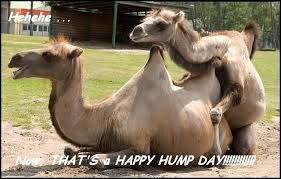记忆方法
1. -ump 表示“有突出感”.
2. lump: 肿块,疙瘩.
3. plump: 丰满的(漂亮的突出).
4. hump: 驼峰.
2. lump: 肿块,疙瘩.
3. plump: 丰满的(漂亮的突出).
4. hump: 驼峰.
中文词源
hump 土墩,丘,驼峰,驼背
来自Proto-Germanic*hump,来自PIE*kemb,弯,转,词源同cubicle,hip.引申词义连绵的山丘,土墩,后用于指骆驼的驼峰,人的驼背。
英语词源
- hump
-
hump: [18] Hump seems to have originated among the Low German dialects of North Germany and the Low Countries – Dutch, for instance, has the probably related homp ‘lump’. It first appeared in English towards the end of the 17th century in the compound hump-backed, but by the first decade of the 18th century it was being used on its own. (Another theory is that it arose from a blend of the now obsolete crumpbacked with hunchbacked [16], whose hunch- is of unknown origin.)
- hump (n.)
- 1680s (in hump-backed), from Dutch homp "lump," from Middle Low German hump "bump," from Proto-Germanic *hump-, from PIE *kemb- "to bend, turn, change, exchange." Replaced, or perhaps influenced by, crump, from Old English crump. A meaning attested from 1901 is "mound in a railway yard over which cars must be pushed," which may be behind the figurative sense of "critical point of an undertaking" (1914). Humpback whale is from 1725.
- hump (v.)
- "to do the sex act with," attested from 1785, but the source of this indicates it is an older word. Meaning "to raise into a hump" is from 1840. Related: Humped; humping.
权威例句
- 1. Fans just get the hump when they lose.
- 如果他们输了,球迷便会很恼火。
- 2. the dark hump of the mountain in the distance
- 远处高大的黑魆魆的山
- 3. She gets the hump when people don't listen to her.
- 别人不听她的话时,她总是很生气.
- 4. He made her hump.
- 他使她奋发.
- 5. The path goes over a large hump by a tree before running near a road.
- 小道越过一处傍树的大圆丘,然后沿着一条大路向前延伸。

